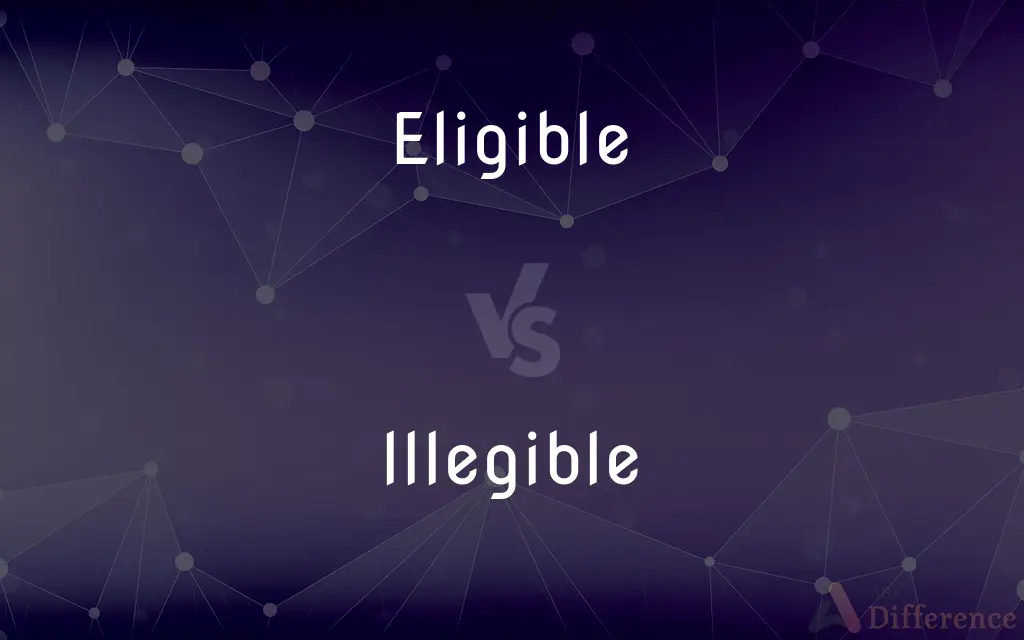Eligible vs. Illegible — What's the Difference?
Edited by Tayyaba Rehman — By Maham Liaqat — Updated on March 27, 2024
Eligible refers to meeting the necessary conditions for something, whereas illegible describes handwriting or print that is difficult or impossible to read.

Difference Between Eligible and Illegible
Table of Contents
ADVERTISEMENT
Key Differences
Eligible is often used in contexts where certain criteria or qualifications must be met to be considered suitable for a position, status, benefit, or activity. On the other hand, illegible pertains to the readability of text. It is used to describe writing, printing, or any form of text that is so poorly executed or obscured that it cannot be easily read or understood. This could result from poor handwriting, the condition of the text (such as fading or damage), or a stylistic choice that sacrifices clarity.
While eligibility is a concept tied to suitability and qualifications, illegibility is related to clarity and the physical or visual aspects of written communication. One deals with standards and conditions that allow for certain opportunities or rights, and the other addresses the practical aspect of being able to comprehend written text.
An individual's status or qualifications make something eligible, which is an inherently human-centric concept, relying on societal, institutional, or personal criteria. Conversely, illegibility is a characteristic of the text itself, independent of human qualities or achievements, and is often unintentional, arising from various factors like hurried writing, the condition of the writing medium, or even a deliberate artistic choice.
The importance of being eligible lies in the opportunities it affords individuals—access to jobs, programs, benefits, or rights that are otherwise restricted. Eligibility can often be influenced or changed through personal action or circumstance, such as acquiring a needed skill or reaching a certain age. Illegibility, however, poses challenges to communication, requiring effort for interpretation or rectification, like rewriting or employing digital tools for clarity.
Eligibility and illegibility, though completely unrelated in their application, both play significant roles in societal functioning. The former is crucial in determining access to opportunities and maintaining standards within systems, while the latter affects the efficiency and effectiveness of written communication, which is foundational to human interaction.
ADVERTISEMENT
Comparison Chart
Definition
Meeting the necessary conditions or criteria
Difficult or impossible to read
Context
Suitability for rights, positions, benefits
Readability of text
Implications
Access to opportunities, compliance with rules
Challenges in communication, need for clarity
Based on
Qualifications, criteria
Quality of handwriting or print
Importance
Determines access and rights
Affects clarity and understanding of text
Compare with Definitions
Eligible
Suitable or worthy of choice.
Only eligible candidates were considered for the position.
Illegible
Writing that lacks clarity and form.
The note was scribbled in an almost illegible manner.
Eligible
Qualified to participate or be chosen.
She was eligible for the scholarship based on her academic performance.
Illegible
Unreadable due to damage or wear.
Water damage rendered the book's pages illegible.
Eligible
Permitted by rules or conditions.
The player was eligible to play after serving his suspension.
Illegible
Text that cannot be deciphered.
The ancient manuscript was mostly illegible.
Eligible
Fit or proper to be chosen.
He was eligible for early retirement benefits.
Illegible
So poorly written as to be unreadable.
His handwriting was so hurried it was illegible.
Eligible
Having the right to do or obtain something; satisfying the appropriate conditions
Eligible candidates
Customers who are eligible for discounts
Illegible
Difficult to read due to poor printing.
The faded print made the document illegible.
Eligible
Qualified or entitled to be chosen
Eligible to run for office.
Eligible for retirement.
Illegible
Not clear enough to be read
His handwriting is totally illegible
Eligible
Desirable and worthy of choice, especially for marriage
An eligible bachelor.
Illegible
Not legible or decipherable.
Eligible
(Football) Allowed under the rules to catch a forward pass.
Illegible
Not clear enough to be read; unreadable; not legible or decipherable.
Eligible
A person who is eligible.
Illegible
Incapable of being read; not legible; as, illegible handwriting; an illegible inscription.
Eligible
Allowed to and meeting the necessary conditions required to participate in or be chosen for something
Illegible
(of handwriting, print, etc.) not legible;
Illegible handwriting
Eligible
Worthy of being chosen (for marriage).
Eligible
One who is eligible.
Eligible
That may be selected; proper or qualified to be chosen; legally qualified to be elected and to hold office.
Eligible
Worthy to be chosen or selected; suitable; desirable; as, an eligible situation for a house.
The more eligible of the two evils.
Eligible
Qualified for or allowed or worthy of being chosen;
Eligible to run for office
Eligible for retirement benefits
An eligible bachelor
Eligible
Prohibited by official rules;
An eligible pass receiver
Common Curiosities
How can I improve my handwriting to avoid it being illegible?
Practice consistently, focus on forming letters clearly, and slow down your writing pace.
What steps can be taken if text is illegible?
Rewriting, digital scanning and enhancement, or consulting with a specialist for interpretation.
Can digital texts be illegible?
Yes, if they are poorly designed, use hard-to-read fonts, or are displayed at low resolutions.
What makes someone eligible for a program?
Meeting the program's specific requirements or criteria.
How do organizations ensure clarity in important texts?
Through clear handwriting, professional printing, and avoiding conditions that could make text illegible.
Why is eligibility important in competitive situations?
It ensures fairness and that all participants meet a standard set of criteria.
Can eligibility be temporary?
Yes, one's eligibility status can change based on circumstances, such as age or employment status.
Can illegible writing be legally binding?
Potentially, if parties can prove intent and agreement, though clarity is always preferable.
Does eligibility guarantee access or acceptance?
Being eligible allows one to be considered, but it does not guarantee selection or acceptance.
Can eligibility criteria be changed?
Yes, institutions or organizations can revise them based on new policies or standards.
Is eligibility always determined by positive qualities?
Generally, yes, but it can also include circumstantial factors like age or residency.
Is eligibility the same as entitlement?
No, eligibility means meeting criteria for consideration, while entitlement means having a right to something.
Can eligibility be subjective?
While based on set criteria, the interpretation of these criteria can have subjective elements.
What role does technology play in dealing with illegible texts?
Technology offers tools for enhancing, deciphering, and even translating illegible texts.
What are the consequences of submitting illegible documentation?
It can lead to misunderstandings, delays in processing, or outright rejection of the document.
Share Your Discovery

Previous Comparison
Railway vs. Railroad
Next Comparison
Underappreciated vs. UnappreciatedAuthor Spotlight
Written by
Maham LiaqatEdited by
Tayyaba RehmanTayyaba Rehman is a distinguished writer, currently serving as a primary contributor to askdifference.com. As a researcher in semantics and etymology, Tayyaba's passion for the complexity of languages and their distinctions has found a perfect home on the platform. Tayyaba delves into the intricacies of language, distinguishing between commonly confused words and phrases, thereby providing clarity for readers worldwide.













































